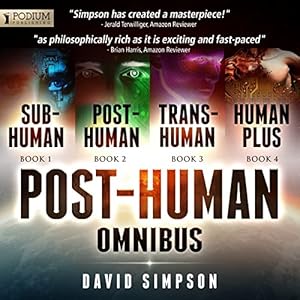An intriguing speculative look at the implications of Moore’s Law for humanity’s future
 |
| Simpson, David. Post-Human Omnibus edition. Podium Publishing: 2014. |
At one point, this collection, actually four books in one, referenced Arthur C. Clarke’s famous idea that any form of technology, if far enough ahead of another civilization’s, is essentially just like magic. That insight certainly applies to the level of technological sophistication of the post-human civilization described in Simpson’s vision of the future—and this has both positive and negative implications. It’s fun, to be sure, to speculate about a nanobot-based civilization in which virtually anything can be made, as it were, out of thin air (much like that Johnny Depp movie).
 |
| Magic! |
But it has limited applicability to today’s world, as that
sort of magical, commuting-to-Venus-using-only-my-magic-magnetic field idea is
so far beyond today’s technology that it has no useful connection to the ‘real’
world. This sort of speculation about the rapid pace of technological
progression is still interesting, though, and some more theoretical aspects of
the society of the future, especially the debate about strong AIs and so forth,
struck me as far more interesting than the fanciful imaginings of futuristic
bolts of green energy or space-time travel. Moreover, Simpson is at his descriptive
best in scenes of combat, and struggles a bit more on the characterization
side, or rather, on the likeability of his characters. Craig is, at least to my
mind, a deeply unsympathetic character without really achieving anti-hero
status; he’s just kind of a jerk, and that proved to be an obstacle to my
engagement with the series; similarly, the poetically named James Keats was
less impressive, because less relatably human, than he could have been with
another treatment. In Simpson’s defense, Keats is a sort of bridging figure,
standing in the gulf between humanity and post-humanity/AI/etc., and that might
explain his slightly alien nature.
In any case, my favorite of the four-book series is
definitely the outlier, the final book (Human Plus), a mystery which, while
relatively easy to unravel, is much closer (temporally and in all other ways)
to “our” reality today, and as such beats the pants off the hocus-pocus in the
more futuristic explorations of humankind’s destiny throughout the first three books. The book wrestles with one of the key
questions about any machine intelligence: what sort of ethical understanding
would such a being likely have? Is there any way of guessing or predicting such
an entity’s perspective on humankind? There have certainly been plenty of sci
fi doom-saying movies about the dangers of AI, and how such a creature would
surely regard humankind as a threat to its own existence and seek to eliminate
that threat. But what basis is there for this sort of fear? Put differently,
could machines be capable of altruism?
The rest of the series, which extends decades into a future
made remote and unrecognizable by the rapid advance of technology, is still
plenty entertaining, just less philosophically rewarding than the final book.
If you’re a fan of this sort of technological exploration of humanity’s future,
then you will doubtless enjoy the entire series; but I suspect many will find
Human Plus especially worthwhile.
Objective assessment: 6/10
Bonuses: +1 for crafting an excellent prequel in the final
book, Human Plus, with the most human, believable character of the whole
series; +1 for expertly playing out several thought experiments about what
might happen in the future if Moore’s Law holds
Penalties: -1 for drifting so far into the future the ‘technology’
of the posthumans is essentially just magic, and as such has few lessons for us
lowly Earthlings today
Nerd coefficient: 7/10 “An enjoyable experience, but not
without its flaws”
Note that 7/10 is better than it probably sounds—check here for
details of our scoring policy.
Zhaoyun has been reading and reviewing this sort of sci/fi (as well as fantasy) here at Nerds of a Feather since 2013, so for literally dozens of months now, and shows no signs of letting up yet!